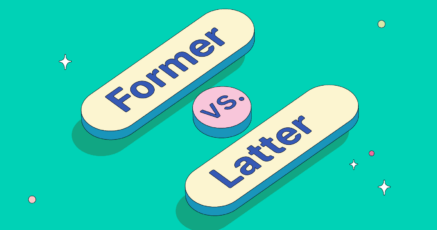Commonly Confused Words - Page 3
 “Worse” vs. “Worst”: What’s the Difference?Two commonly misused adjectives are worse and worst. Because these words look and sound similar, it can be tough to differentiate...August 23, 2023
“Worse” vs. “Worst”: What’s the Difference?Two commonly misused adjectives are worse and worst. Because these words look and sound similar, it can be tough to differentiate...August 23, 2023 “Objective” vs. “Subjective”: What’s the Difference?Objective and subjective are two common—and commonly confused—words used to describe, among other things, information and...August 18, 2023
“Objective” vs. “Subjective”: What’s the Difference?Objective and subjective are two common—and commonly confused—words used to describe, among other things, information and...August 18, 2023 When to Use “Past” vs. “Passed”: Definitions and ExamplesRemember the feeling of taking your driving test? Your palms were sweaty and your posture rigidly straight as you tried your...August 9, 2023
When to Use “Past” vs. “Passed”: Definitions and ExamplesRemember the feeling of taking your driving test? Your palms were sweaty and your posture rigidly straight as you tried your...August 9, 2023 How to Use the Prefixes “Dis” and “Un” CorrectlyWe use words that begin with the prefixes dis and un every day: Perhaps you’ve told someone you’re disappointed or unconvinced or...July 19, 2023
How to Use the Prefixes “Dis” and “Un” CorrectlyWe use words that begin with the prefixes dis and un every day: Perhaps you’ve told someone you’re disappointed or unconvinced or...July 19, 2023 “Coming Down the Pike” vs. “Coming Down the Pipe”Every language has its idioms, phrases with a known meaning that can’t be taken at face value. Idioms are often used to...July 14, 2023
“Coming Down the Pike” vs. “Coming Down the Pipe”Every language has its idioms, phrases with a known meaning that can’t be taken at face value. Idioms are often used to...July 14, 2023 A Guide to Using “Me” and “I”Knowing when to use me and I can be confusing, so here is a quick guide: Use me when you’re talking about an action done to,...July 10, 2023
A Guide to Using “Me” and “I”Knowing when to use me and I can be confusing, so here is a quick guide: Use me when you’re talking about an action done to,...July 10, 2023 “Palate,” “Palette,” or “Pallet”? How to Use Each Word CorrectlyThere are several tricky words in the English language that even the most seasoned speakers and writers can still find confusing....July 5, 2023
“Palate,” “Palette,” or “Pallet”? How to Use Each Word CorrectlyThere are several tricky words in the English language that even the most seasoned speakers and writers can still find confusing....July 5, 2023 When to Use “Former” vs. “Latter,” With ExamplesThe terms former and latter are used to distinguish between two things mentioned in a sentence. The rules for using former versus...June 23, 2023
When to Use “Former” vs. “Latter,” With ExamplesThe terms former and latter are used to distinguish between two things mentioned in a sentence. The rules for using former versus...June 23, 2023 “Has” vs. “Have”: What’s the Difference?Has and have are two of the English language’s most popular words to describe possession. But just because these words are used...June 9, 2023
“Has” vs. “Have”: What’s the Difference?Has and have are two of the English language’s most popular words to describe possession. But just because these words are used...June 9, 2023 “Inter” vs. “Intra”: What’s the Difference?The prefixes inter- and intra- are commonly confused because of their similar spellings, but once you look at their definitions,...June 5, 2023
“Inter” vs. “Intra”: What’s the Difference?The prefixes inter- and intra- are commonly confused because of their similar spellings, but once you look at their definitions,...June 5, 2023